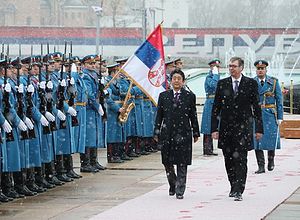On Wednesday, Japan’s Prime Minister Shinzo Abe returned from an official visit to Romania, wrapping up a five-day tour of three Baltic and three Eastern European countries. Abe toured six countries over five days — Estonia, Latvia, Lithuania, Bulgaria, Serbia, and Romania — seeking to bolster political diplomacy and bilateral business links in the region as well as addressing regional security issues.
Abe invited a delegation of 30 representatives from big Japanese businesses, such as global e-commerce giant Rakuten and cybersecurity firms, to accompany him on the official tour. In doing so, the prime minister sent a strong signal that Japan is open for business and shopping around to expand its business opportunities.
During the final leg of talks in Romania, Abe agreed with the country’s President Klaus Iohannis to implement initiatives to encourage Japanese businesses to tap into the operation and investment potential of the European country. For Japanese firms eyeing new manufacturing and automotive hubs, Abe drew attention to Romania’s inexpensive workforce and its reputation for maintaining steady economic growth relative to other EU member nations.
Abe applauded Japanese firms who have made inroads into Romania, pointing to the creation of 40,000 jobs. He also praised the development potential of the Romanian economy as the “main pillar to bolstering bilateral ties.” As an added sweetener, to make travel and inter-country exchanges easier, both leaders welcomed a visa waiver deal for Romanian tourists visiting Japan.
Japan is Romania’s largest Asian investor and Abe is the first Japanese head of government to pay an official visit to the country. But no business negotiation is complete without political drama. In an embarrassing turn of events, a scheduled meeting with Romanian Prime Minister Mihai Tudose was unexpectedly canceled. Abe landed in Bucharest to discover his Romanian counterpart had stepped down the night before due to mounting internal party pressure. Without time for a successor to be brought up to speed, Romanian President Klaus stepped in one day earlier than anticipated to meet with Abe and Vice Prime Minister Paul Stanescu took Tudose’s place at meeting with the Japanese business delegation.
It comes as no surprise that an essential component to Abe’s European tour was to push for the speedy implementation of the EU-Japan economic partnership (EPA), which was reached in December of last year. Bulgaria holds the rotating presidency of the European Union and is expected to plan its agenda for 2018 in the coming months. Abe’s meeting with the Bulgarian prime minister centered around influencing the EU’s planning agenda to ensure the EPA can come into effect by 2019.
The EU- Japan EPA will cover 30 percent of the world’s GDP and is expected to bring upwards of a one percent boost to Japan’s total GDP. The highly anticipated agreement will open channels for European agriculture exports of beef, wine, chocolate, and cheese by lowering tariffs also removing administrative obstacles from European fruit exports to Japan. Speaking soon after the deal was reached, Abe noted that while protectionism was rampant in international trade relations, the EPA “demonstrates the powerful political will of Japan and the E.U.to continue to keep the flag of free trade waving high.”
Also on the economic front, the first half of Abe’s tour yielded mutually beneficial business agreements with Serbia to assist Japanese companies opening business as well as a four-way pact with Estonia, Latvia, and Lithuania. Bilateral agreements between Japan and individual nations are expected to produce results once the EU-Japan EPA comes into effect.
Aside from his business agenda, Abe was on a mission to maximize pressure from Eastern European nations against North Korea’s nuclear provocations. Utilizing the urgency of an imminent global threat, Abe and his European counterparts all delivered statements denouncing North Korea’s military aggression and pledged to step up pressure to counter North Korea’s nuclear missile development.
As China begins to assert influence in Eastern Europe, Japan’s top-level diplomacy is also aimed toward expanding political links and influence in small to medium-sized countries in Europe. In a joint press announcement in Romania, Abe emphasized that “while the international community has become unstable, Japan and Europe share basic values and need to cooperate more than ever.”
During his tour, Abe enticed Baltic and Eastern European nations politically with the temptation of Japanese business opportunities, like a carrot dangling on a stick. Japan’s renewed interest will have a reverberating impact on the region’s business landscape.

































